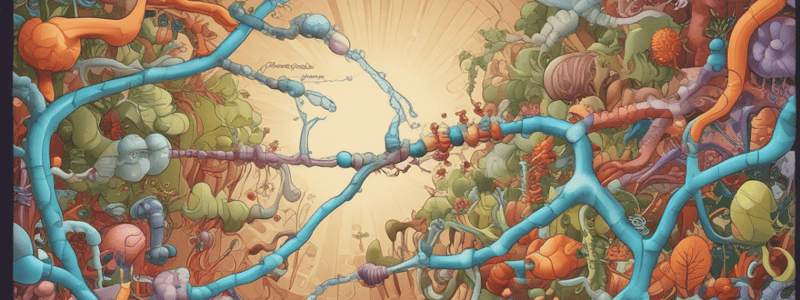Podcast
Questions and Answers
What is the role of glucose-6-P in regulating glycogen synthesis?
What is the role of glucose-6-P in regulating glycogen synthesis?
- It acts as a stimulator (correct)
- It is only involved in glycogenolysis
- It has no effect
- It acts as an inhibitor
What is the effect of high blood glucose levels on glycogen synthesis in the liver?
What is the effect of high blood glucose levels on glycogen synthesis in the liver?
- It has no effect
- It inhibits glycogen synthesis (correct)
- It stimulates glycogen synthesis
- It only affects glycogenolysis
What is the role of protein kinase A in regulating glycogen metabolism?
What is the role of protein kinase A in regulating glycogen metabolism?
- It phosphorylates glycogen synthase, activating it
- It phosphorylates phosphorylase kinase, activating it (correct)
- It has no role in glycogen metabolism
- It phosphorylates glycogen phosphorylase, activating it
What stimulates hexokinase?
What stimulates hexokinase?
What is the effect of insulin on glycogen synthesis?
What is the effect of insulin on glycogen synthesis?
What inhibits hexokinase?
What inhibits hexokinase?
What is the role of calcium ions in regulating glycogen metabolism?
What is the role of calcium ions in regulating glycogen metabolism?
What is the effect of AMP on glycogen metabolism?
What is the effect of AMP on glycogen metabolism?
What stimulates glucokinase?
What stimulates glucokinase?
What stimulates phosphofructokinase-1?
What stimulates phosphofructokinase-1?
What is the role of glycogen phosphorylase in glycogen metabolism?
What is the role of glycogen phosphorylase in glycogen metabolism?
What inhibits glucokinase?
What inhibits glucokinase?
What is the effect of epinephrine and glucagon on glycogen metabolism?
What is the effect of epinephrine and glucagon on glycogen metabolism?
What is the committed step of glycolysis?
What is the committed step of glycolysis?
What is the fate of pyruvate in anaerobic conditions?
What is the fate of pyruvate in anaerobic conditions?
What are the rate-limiting steps of glycolysis?
What are the rate-limiting steps of glycolysis?
What is the fate of pyruvate in aerobic conditions?
What is the fate of pyruvate in aerobic conditions?
What stimulates phosphofructokinase-2?
What stimulates phosphofructokinase-2?
What is the effect of citrate on PFK-1?
What is the effect of citrate on PFK-1?
Which of the following inhibits pyruvate kinase?
Which of the following inhibits pyruvate kinase?
What is the effect of glucagon on PFK-2?
What is the effect of glucagon on PFK-2?
What is the product of anaerobic glycolysis?
What is the product of anaerobic glycolysis?
What is the effect of increased NADH/H+ on anaerobic glycolysis?
What is the effect of increased NADH/H+ on anaerobic glycolysis?
What is the purpose of buffer systems in the body?
What is the purpose of buffer systems in the body?
What is the effect of ATP on PFK-1?
What is the effect of ATP on PFK-1?
What is the effect of insulin on pyruvate kinase?
What is the effect of insulin on pyruvate kinase?
Flashcards are hidden until you start studying
Study Notes
Protein Digestion and Absorption
- Pepsin:
- An endopeptidase active at pH 1-2
- Cleaves peptide bonds after aromatic AAs from N-terminus
- Pancreatic peptidases:
- Endopeptidases: trypsin, chymotrypsin (cleaves aromatic AAs), and elastase (cleaves small AAs)
- Important for protein digestion and absorption
Carbohydrate Metabolism
Glycolysis
- The full oxidation of glucose yields a significant amount of energy
- A catabolic process converting glucose to pyruvate via many enzymes
- Takes place in the cytosol of every cell, especially in the brain and muscles
- Divided into two phases: preparatory and payoff phases
- Preparatory phase: glucose => glyceraldehyde 3-phosphate + dihydroxyacetone phosphate
- Committed step: fructose 6-phosphate converted into fructose 1,6-bisphosphate
- Payoff phase: glyceraldehyde 3-phosphate + dihydroxyacetone phosphate converted into pyruvate
- Rate-limiting steps: glucose converted into glucose 6-phosphate by hexokinase, and fructose 6-phosphate converted into fructose 1,6-bisphosphate by phosphofructokinase-1
- Energy-yielding steps: glyceraldehyde-3-P oxidation, ATP synthesis by phosphoglycerate kinase, and ATP synthesis in the last step of glycolysis
- Fate of pyruvate: converted into acetyl-CoA in aerobic conditions, and into lactate in anaerobic conditions
- Regulation of glycolysis: hexokinase, glucokinase, and phosphofructokinase-1 are regulated by various molecules, including insulin, glucose, and ATP
Gluconeogenesis
- The synthesis of glucose from non-carbohydrate precursors
- Takes place primarily in the liver and to a small extent in the renal cortex and enterocytes
- Follows the same pathway as glycolysis, except for reversible reactions and no ATP generation
- Animals can produce glucose from lactate, amino acids, and glycerol
Glycogen Metabolism
- Place of action: primarily in the liver and muscles, in the cytosol
- Function of glycogen in muscles: energy source
- Function of glycogen in liver: regulates blood glucose levels
- Glycogenesis: making glycogen from glucose
- Glycogenolysis: breakdown of glycogen for quick energy release
- Regulation of glycogen synthesis and degradation: glycogen phosphorylase and glycogen synthase are regulated by allosteric and hormonal mechanisms
Anaerobic Glycolysis and Buffer Systems
- Anaerobic glycolysis = lactic acid fermentation
- Reduction of pyruvate into lactate under anaerobic conditions
- Occurs in vigorously contracting muscles and erythrocytes
- Lactate levels are a predictor for cancer patient survival
- Regulation of anaerobic glycolysis: stimulated by increased NADH/H+, anaerobic conditions, and breakdown of ethanol; inhibited by high lactate levels
- Buffer systems maintain blood pH levels
- Acidosis: blood pH < 7.45
- Hemoglobin buffer system deals with O2 and CO2 levels in erythrocytes
Studying That Suits You
Use AI to generate personalized quizzes and flashcards to suit your learning preferences.




